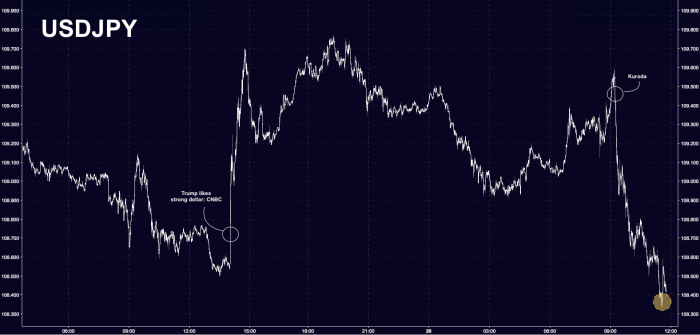So one of the things we spent quite a bit of time on Thursday was what the ongoing slide in the dollar, supercharged this week by Steve Mnuchin’s tacit reiteration of Trump’s adversarial trade stance, means for the ECB and the BoJ.
Mario Draghi’s not-at-all veiled reference to Mnuchin in Thursday’s post-meeting presser was a clear indication that the ECB is acutely aware that a rapidly depreciated dollar has the very real potential to derail the effort to call an end to APP in September and that, in turn, would effectively mean pushing a rate hike back (the ECB won’t hike until QE has officially ended).
The same goes for the BoJ, which earlier this month inadvertently triggered a sharp move in USDJPY when they cut purchases of 10-25Y JGBs. Two weeks later, at the January meeting, the bank tweaked its inflation language, leading to further yen strength before Kuroda tried to calm everyone down with a dovish presser (largely to no avail).
The perception that the ECB and the BoJ are set to lean ever more hawkish weighed heavily on the dollar all month. Thus, Mnuchin’s rhetoric was just fuel on the fire and to the extent, Draghi and Kuroda were already wary about the outsized reaction in the euro and the yen to hawkish December minutes and the paring of JGB purchases, respectively, they’re even more worried now.
Well on Friday, Kuroda told a forum in Davos that he’s seeing “indications of rising wages and prices”. He also underscored the BoJ’s religious commitment to the ever elusive 2% inflation target, but it was the upbeat tone that traders latched onto (i.e. everyone took the positive outlook to be yet another sign that the BoJ will begin to try and normalize policy). Needless to say, that catalyzed an immediate dip in USDJPY which, for the reasons cited above, was vulnerable:

As a reminder, that reaction is precisely why everyone has been saying since January 9 (when the JGB news hit) that Kuroda faces a daunting communications challenge. The slightest hint that he’s leaning in the direction of rolling back stimulus (or even just that he’s gaining confidence on the inflation front) risks an outsized reaction in the yen thanks in no small part to the backdrop of persistent dollar weakness. This is what Albert Edwards warned about three weeks ago.













Leave A Comment